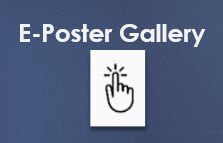
Central European Summer Time CEST/GMT+2
Recorded sessions on demand will be available 24 hours after the session ends
834 Presentations
ESPNIC Young Investigator Awards announcement
ESPNIC Nursing Awards announcement
My Personal Highlights from the Virtual Congress – from the 2020 Committee
Moments from the Virtual Congress – Short video
FULL VIDEO - CLOSING SESSION
Introduction to EAPS 2022 EAPS 2022 Organizing Committee Chair EAPS 2022 Scientific Committee Chair
EAPS Young Investigator Award winner announcement
ESPR Young Investigator Awards winners
Live Q&A
Penicillin allergy in children – myth and evidence
Hygiene hypothesis revisited – what is the future?
THE IMPACT OF RAPID VIRAL TESTING ON ANTIBIOTIC PRESCRIPTION RATE IN FEBRILE CHILDREN WITH RESPIRATORY SYMPTOMS VISITING EMERGENCY DEPARTMENTS (EDS) IN EUROPE
Abstract
Abstract Body
Background and aims
Most children attending the ED suffer from self-limiting respiratory tract infections. However, inappropriate antibiotic prescribing often occurs, which contributes to antimicrobial resistance. We aimed to assess the impact of rapid viral testing at the ED on antibiotic prescription rate.
Methods
This study is part of the MOFICHE/PERFORM study on febrile children (0-18 years) attending 12 European EDs. In children with respiratory symptoms, we performed multivariate regression analysis regarding antibiotic prescription adjusted for patient characteristics, disease severity, focus of infection and hospital. We evaluated the influence of: (1) availability of rapid viral testing at the EDs (N=20,707), (2) performing versus not performing a rapid viral test (N=12,524), (3) positive versus negative test results (N=1213) on antibiotic use.
Results
Patients in 6 EDs equipped with a rapid viral test more often received antibiotics compared to patients in 6 EDs without a rapid viral test (aOR 1.8, 95%CI 1.2-2.7). Antibiotic prescription rate was comparable in patients in whom a test was performed versus patients who were not tested (aOR 1.0, 95%CI 0.9-1.2). Children testing positive less often received antibiotics than children testing negative (31% versus 38%, p<0.001). CRP level was elevated (>60 mg/L) in 19% of the positive tested children receiving antibiotics.
Conclusion
Our data show an overall higher antibiotic prescription rate in EDs equipped with a rapid viral test and a comparable antibiotic prescription rate in patients with versus without test performed. Although antibiotic prescription was lower in children testing positive, one third of these children still received antibiotics.

